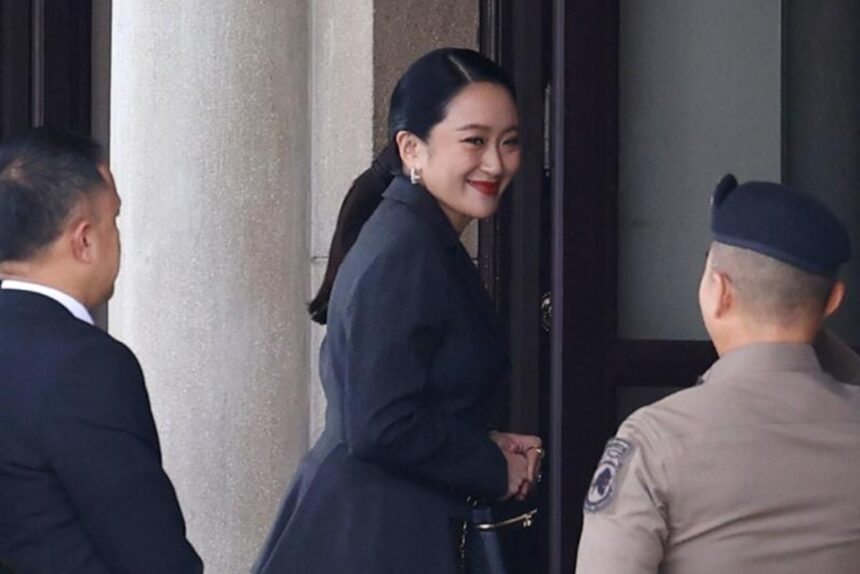BANGKOK – Thailand’s Constitutional Court removed Prime Minister Paetongtarn Shinawatra from office over ethics breaches tied to a leaked call with former Cambodian leader Hun Sen.. This ruling creates fresh instability in Thai politics, weakening the powerful Shinawatra family further and leaving the country facing fresh doubts about its political direction.
The court’s judgment, related to dishonesty and breaches of ethical conduct, highlights the continuing struggle between the Shinawatra camp and Thailand’s military-backed royalist leadership. With the economy struggling and public frustration boiling over, the question of leadership hangs over the nation.
Paetongtarn Shinawatra’s Removal
Paetongtarn, daughter of former Prime Minister Thaksin Shinawatra, became the country’s youngest prime minister at 38 in August 2024. Her time in office started under scrutiny. The issue centred on a phone call from 15 June 2025, in which Paetongtarn Shinawatra referred to Hun Sen as her “uncle”, criticized a top Thai military officer, and appeared too eager to please the Cambodian leader during talks about a border dispute.
Hun Sen released the recording himself, which made critics accuse Paetongtarn of threatening Thai interests and disrespecting the military. The backlash was swift, with protests, calls for investigations, and a petition signed by 36 senators. The court first suspended Paetongtarn on 1 July 2025 while it reviewed the matter.
A unanimous vote followed to examine the petition. On 29 August, the court voted 7-2 to remove Paetongtarn Shinawatra. Judges said she had not shown the integrity required by the Constitution.
Although Paetongtarn Shinawatra apologized and claimed she wanted to prevent conflict, she became the sixth Shinawatra-connected prime minister ousted by courts or the military in twenty years.
Her father, Thaksin, was removed in a 2006 coup, her aunt Yingluck was dismissed after a 2014 court decision and coup, and former leader Srettha Thavisin lost office in 2024 over ethics complaints.
Shinawatra Family’s Struggles
Paetongtarn’s removal highlights the deep divide between the populist Shinawatra movement and Thailand’s elite establishment, backed by the military and monarchy. The Shinawatra family, through the Pheu Thai Party, has dominated elections since 2001 with strong rural support, but has often faced intervention by unelected bodies.
Critics often accuse the Constitutional Court of favouring the royalist-military camp.
Since 2006, it has disbanded 34 political parties, including the progressive Move Forward Party in 2023, and forced out several prime ministers. These moves, many say, weaken Thailand’s democracy and contribute to repeated outbreaks of political crisis.
Paetongtarn Shinawatra’s short spell as leader featured a weakening economy and falling support. Her approval rating dropped from nearly 31 percent in March to just over 9 percent by June. Her government failed to revive the economy, and the phone call episode only made things worse.
Experts like Napon Jatusripitak from the ISEAS-Yusof Ishak Institute say the Shinawatra name suffered serious damage. Many saw Paetongtarn as inexperienced and still dealing with the fallout from Thaksin’s divisive return from exile in 2023.
Thailand’s Next Steps
Paetongtarn’s departure sets up a complicated route to appoint a new prime minister. The 2017 constitution (written under the military) limits candidates to five names nominated before the 2023 general election. Only one comes from Pheu Thai: Chaikasem Nitisiri, a former attorney general aged 77 and a loyal ally of Thaksin.
Another is Anutin Charnvirakul, head of the Bhumjaithai Party, which recently left Paetongtarn’s coalition. Former coup leader Prayuth Chan-ocha is also eligible but has retired from politics.
Parliament will need to vote on the next prime minister. Pheu Thai’s alliance has only a slim majority, especially after Bhumjaithai’s exit. The party must try to persuade partners to back their choice; if talks break down, the process could drag out.
The opposition People’s Party, which followed on from Move Forward, has strong public support and might push for a snap election, but this depends on parliamentary consent.
For now, acting prime minister Phumtham Wechayachai, a committed Thaksin supporter, remains in charge after taking on the caretaker role in July. Paetongtarn continues as Minister of Culture, a post she began after being suspended, but her political career remains under threat.
The National Anti-Corruption Commission is reviewing her conduct during the call, which could mean a case at the Supreme Court and a possible ban from office.
Democratic Reforms in Thailand
Thailand’s economy is only expected to grow by 2.3 percent in 2025, reflecting the uncertainty. Paetongtarn’s plan to boost tourism and stimulate the economy (called “Ignite Thailand”) is now at risk.
Ongoing upheaval may push investors away and slow down needed policy changes. Demonstrations in Bangkok show frustration not only with government failures, but also with the way unelected bodies have kept intervening.
Chaikasem Nitisiri is viewed as the most likely successor, thanks to Pheu Thai’s numbers in parliament. However, his low profile and lack of senior ministerial experience could cause problems in a divided environment.
If the mood changes in parliament, Anutin Charnvirakul could be a compromise option, but his recent decision to leave the government suggests he is not eager to step in. This decision will show whether Pheu Thai can keep its partners on side and hold off growing opposition.
Paetongtarn’s ousting is a fresh blow for democratic reforms in Thailand and puts the spotlight again on the courts’ influence in politics. Whoever ends up as prime minister will need to tackle economic problems and answer public demands for fairer politics.
The next government will face pressure to break the cycle of instability that has defined Thai politics for much of the last two decades.














